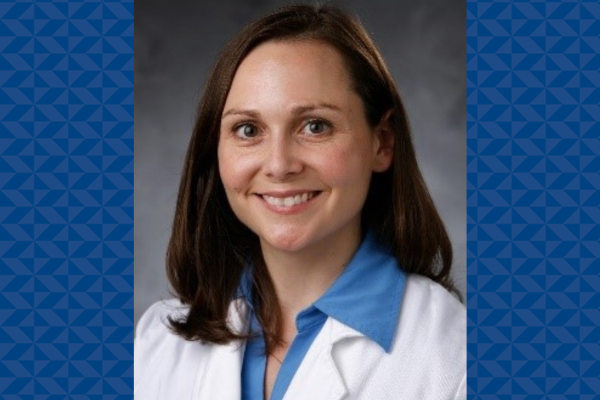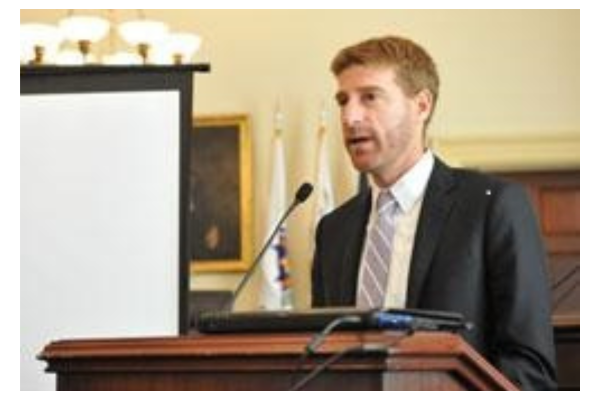
Dr. Jamie L. Todd, associate professor in the Division of Pulmonary, Allergy and Critical Care Medicine, is the recipient of the 2025 Cystic Fibrosis Foundation (CFF) Mitch Greenberg Memorial Award in Lung Transplantation.
The Mitch Greenberg award is given to the top-ranked awardee of the CFF research grant program for approaches to early diagnosis and treatment of chronic lung allograft dysfunction (CLAD), the main complication after transplant which presents as chronic rejection with lung function decline. There are currently no approved therapies for CLAD.
Dr. Todd’s research grant focuses on lung tissue transcriptional profiling to define molecular endotypes of CLAD. She has dedicated her career to advancing scientific knowledge related to the clinical risk factors and biological mechanisms underlying the development of lung fibrosis, including that occurring in CLAD and diseases leading to transplantation like pulmonary fibrosis.
Median survival for lung transplant patients is approximately seven years, a lower long-term survival compared to other commonly transplanted solid organs due to higher rates of rejection in lung recipients. While cystic fibrosis (CF) patients can experience improvements in quality of life and short-term survival with lung transplant, long-term survival remains limited.
"Essentially all of the treatments we have for lung transplant recipients come from other organ groups," Dr. Todd said. "But they are ineffective in preventing or treating CLAD in our patients, so we are really interested in better understanding the lung-specific biology. These established therapies for other organs are not translating well to meaningful improvements in our lung transplant patients."
Targeted Treatments for Lung Transplant Recipients
Dr. Todd aims to better identify the molecules involved in the genesis of CLAD to uncover targeted treatment options, whether those treatments are currently available and could be applied to this new disease area or whether this research provides a biological rationale for the development of new agents targeted to a certain pathway active in CLAD.
"It starts with patient care, being a good physician and being a good partner to your patients as they navigate the complex journey of lung transplantation," she said. "Prior to transplant, patients struggle to breathe. They receive their lung transplant, and most of the time they feel great, with their breathing returning to normal and enabling a full life. Then several years later, their lung function declines again, and we have no answers. Only a small percentage of these patients are eligible for another transplant, so advancing therapies for preventing or treating CLAD is critical."
 One of those patients was Mitch Greenberg, for whom Dr. Todd’s award is named. He underwent lung transplantation three times before passing away from cystic fibrosis at the age of 44. In partnership with the Cystic Fibrosis Foundation, the Greenberg Family has created a community dedicated to improving outcomes for people with CF pursuing lung transplantation. Though Dr. Todd did not personally know Mitch Greenberg, she is motivated by patients like him and her partnerships with them.
One of those patients was Mitch Greenberg, for whom Dr. Todd’s award is named. He underwent lung transplantation three times before passing away from cystic fibrosis at the age of 44. In partnership with the Cystic Fibrosis Foundation, the Greenberg Family has created a community dedicated to improving outcomes for people with CF pursuing lung transplantation. Though Dr. Todd did not personally know Mitch Greenberg, she is motivated by patients like him and her partnerships with them.
CLAD is a heterogeneous disease with some patients experiencing a slower progression where they might survive three to five years after onset, and others progressing rapidly to death or needing re-transplant within a year or two. The reasons for these different survival patterns are not well understood.
Dr. Todd’s goal is to find biological subsets of the disease that correspond to patient outcomes, to identify treatments based on a better understanding of the molecular signals turned on and off in patients who fare poorly after the onset of CLAD.
By focusing on the clinical risk factors and disease mechanisms underlying CLAD, Dr. Todd hopes to better understand how to mitigate its onset and treat it when it develops. Her work builds on previous Cystic Fibrosis Foundation awards also focused on CLAD, where she developed preliminary data from lung allograft biopsies.
Duke Enhances Lung Transplant Research
The research is possible due to the robust lung transplantation clinical program (Medical Director, John Reynolds MD) and the unique structure for lung transplant research at Duke. Additionally, Todd credits pivotal NIH-funded work that Duke has been involved in over the years as one of the nation’s largest lung transplantation programs.
Dr. Todd’s CFF research proposal draws on a Duke cohort of lung transplant recipients and utilizes an NIAID-funded prospective observational study called the Clinical Trials in Organ Transplantation-20 (CTOT-20) study (PI, Scott Palmer, MD, MHS), a multicenter observational study of lung transplant recipients aimed at better understanding the clinical risks and mechanisms of CLAD.
The new CFF award recognizes Dr. Todd’s work to identify tissue-based molecular endotypes of CLAD. Profiling immunological, inflammatory, injury, and remodeling pathways in lung allograft tissues obtained at CLAD onset will identify patients with distinct disease endotypes, she hypothesizes.
Using unsupervised clustering and supervised machine learning classification models, she will look at biological disease endotypes and define their clinical importance regarding post-CLAD survival in both a discovery and validation cohort. This work will be done in collaboration with research scientist Rachel Myers, PhD, who manages the DOM’s Bioinformatics and Clinical Analytics Team (BioCAT).
Her second aim is to determine if the molecular features of CLAD endotypes can be detected in allograft biopsies obtained early after transplantation prior to lung function decline. This is important because it will enable interventions to be applied before graft function is lost.
“Most research projects are in and of themselves not paradigm shifting. It's moving the needle. If you can do that consistently for 10, 20, or 30 years, maybe you have shifted the paradigm in a clinically meaningful way,” she said. “It sounds cliché, but this is the best job in the world because it is rewarding to translate clinical experience and patient care into research motivation. It helps sustain effort over time.”
Dr. Todd has been a dedicated mentor and coach in the Duke Department of Medicine Fellows Research Academy since joining the faculty in 2012. She is a 2005 graduate of the University of Colorado School of Medicine and completed her residency, chief residency, and fellowship in pulmonary medicine at Duke.
“I am deeply honored to receive this award named in memory of Mitch Greenberg. This recognition is a reminder of the enduring impact of the patients I have had the privilege to care for and who have generously contributed to our research. It is their tenacity, commitment, and vision for a better future propel us forward,” Dr. Todd said.
Thank you for keeping his memory alive through your research,” Gayle Greenberg, Mitch Greenberg’s mother, wrote to Dr. Todd. “It brings me much satisfaction that his name lives on and he is remembered. He was an amazing person who loved life more than anything. I hope that others might live because of these efforts.”